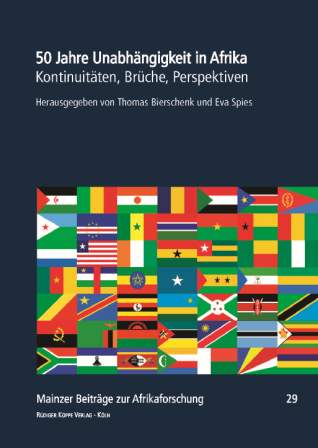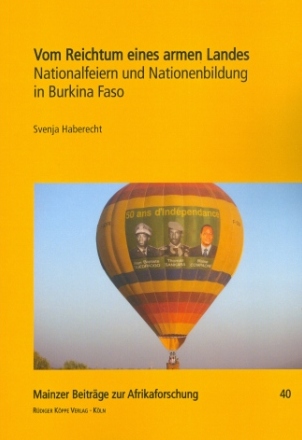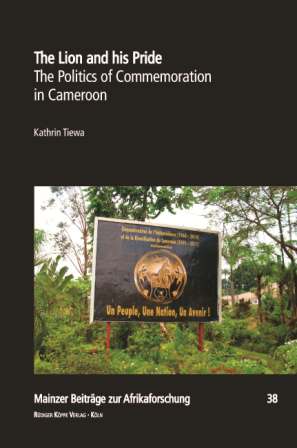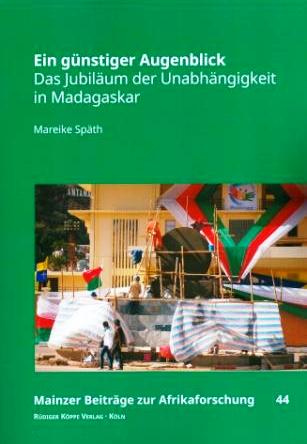





“Our country is an abiku country. Like the spirit-child, it keeps coming and going. One day it will decide to remain. It will become strong.“ (Ben Okri, Nigerian writer, 1991)
Around the year 2010, many countries in Africa south of the Sahara have celebrated half a century of political independence. The celebrations were an opportunity to discuss how “independent” Africa really is and how it is that the politically independent states do so difficult for five decades to be “strong”.
Against this background, the twenty-three contributions of the book take stock of the last fifty years and formulate views on the future challenges of the continent. From different technical perspectives (of the culture, the language, to the economics) reknowned German and African authors expose, how comprehensive the continent changed in the last fifty years, not only in the political and economic, but especially in the social and cultural fields. Contributions to religion, media, city, film, literature, music, economics or politics characterize the transformation processes of the past decades and present a diverse and multi-faceted African contemporary.
The essays also reveal the longevity of colonial economic and political structures that are increasingly coming into conflict with the social and cultural dynamics. It is mainly young artists, academics and religious groups that are testing these new ways of independence by separating from developing definitions and political models of the Global North and its own elites and strive so after “discursive sovereignty” (Patrice Nganang).
These social and cultural trends are perhaps the greatest development potential of Africa. The challenge is to use it productively, so that the African abiku spirit child decides to stay permanently.
CONTENTS
Thomas Bierschenk / Eva Spies: Afrika seit 1960 – Kontinuitäten, Brüche, Perspektiven
GESELLSCHAFTLICHE TRENDS
Hans Peter Hahn: Zur Dynamik urbaner Lebenswelten in Afrika
Rose Marie Beck: Stadtsprachen in Afrika
Katrin Langewiesche: Zwischen Afrika und Europa – Aspekte des Christentums in Afrika nach den Unabhängigkeiten
Roman Loimeier: Die Muslime in Afrika zwischen kolonialem Erbe und Nationalstaat
Erdmute Alber / Tabea Häberlein / Jeannett Martin: Verwandtschaft in Afrika – Transformationsprozesse im 20. Jahrhundert
Thomas Bierschenk: Schulische Bildung in Afrika – Privates Gut, öffentliches Gut, globales Gut?
NATION UND NATIONENBILDUNG
Carola Lentz: Die Nation feiern, die Nation debattieren – Fünfzig Jahre Unabhängigkeit und Nationenbildung in Afrika
Christine Fricke: Nation und Nationalismus in Afrika – Prozesse und Perspektiven
Paul Nugent: Haben Nationen einen Magen? Essen, Trinken und vorgestellte Gemeinschaften in Afrika
POLITISCHE ÖKONOMIE
Peter Meyns: Fünfzig Jahre politische Unabhängigkeit in Afrika – Versuch einer Bilanz
Andrea Behrends / Julia Pauli: Zwischen Charisma und Korruption – Kontinuitäten und Brüche in der Auseinandersetzung mit Eliten in Afrika
Thomas Bierschenk: Staaten in Arbeit, und arbeitende Staaten in Afrika – Sedimentierungen, Fragmentierung und normative Dilemmata
Uta Ruppert / Dörte Rompel: Geschlechterpolitik im Wandel – Frauen machen Staat in Afrika
Helmut Asche: Die Wirtschaft Afrikas seit 1960
Theo Rauch: Transformation mit Kontinuität – Afrikas Kleinbauern im fortwährenden Spagat zwischen Subsistenz und Märkten
MEDIEN, KUNST UND POPULÄRKULTUR
Tilo Grätz: Aufbruch, Propaganda, Liberalisierung – Medienumbrüche und Medienaneignung in Afrika
Anja Oed: „We were ready for big and beautiful things“ – Afrikanische Literatur seit der Unabhängigkeit
Cassis Kilian: Flimmernde Utopien – 50 Jahre afrikanischer Film
Hauke Dorsch: Vom „Indépendance Cha Cha“ zu „Quitte Le Pouvoir“ – Afrikanische Popmusik seit der Unabhängigkeitsära
PERSPEKTIVEN UND HERAUSFORDERUNGEN
Georg Schäfer: Afrikas Perspektiven in der globalen Finanz- und Wirtschaftskrise
Carlos Lopes: Neue Brüche, alte Wunden – Afrika und die Erneuerung der South Agency
Patrice Nganang: Was heißt (schon) Unabhängigkeit? Autobiographie eines Konzeptes
About this book
Review by Geert Castryck in Afrika Spectrum 2/2015
Under these links you will find further studies of the independence of African countries and publications of the contributors:
The volume […] is a compendium of 23 chapters that lucidly take stock and address societal continuitiues and transformations of the past five decades. As the editors elaborate in the informative introduction, the volume provides not only a retrospect, but most of the 26 authors also refer to future challenges. […] The editors roughly organise the different contributions in four parts […]
Hence, this volume adresses a huge range of contexts. However, regardless of the different regional and topical foci of the individual chapters, a characteristic that runs through the entire volume is the authors’ efforts to transcend different boundaries. Most chapters question the time restriction and overcome temporal boundaries. Thus, various contributions address not only the past five decades of the independence momentum but look beyond this period and stress other crucial historical moments. […]
The book also breaks territorial boundaries; hence many chapters follow a transnational perspective. [...] the book is a very rich reader and can be eminently recommended as an inspiring sourcebook for students, scholars, and all other professionals interested in looking back to the future of sub-Saharan Africa [...]
Michelle Engeler in Journal of Modern African Studies, 51/4, 2013, 715-718
The best chapters are by Thomas Bierschenk, who presents a very subtle analysis of the complexities of African bureaucracies, based on years of anthropological research; Paul Nugent, who interestingly ponders the idea of national identity through food and drink culture; Carola Lentz, who analyses the different ways that African states celebrated their fiftieth anniversary of independence, an original contribution based on the work of doctoral students.
Klaas van Walraven in Journal of African History, 55/1, 2014, 106-107
Da der inhaltliche Rahmen des Buches sehr breit ist, fügen sich in diesem Band verschiedene Themen aneinander, die von unterschiedlichen Forschungstraditionen und Methoden geprägt sind. Jedoch bieten alle Artikel sehr gute und teils unerwartete, da neue Perspektiven sowie Ein- und Überblicke für bestimmte Themengebiete. Ein theoretischer Rahmen fehlt zwar, dennoch kristallisieren sich aus den Beiträgen zwei Dynamiken, welche Afrika gegenwärtig prägen: eine Kontinuität von wirtschaftlichen und politischen Strukturen, die zu einem großen Teil noch in der Kolonialzeit begründet liegen, sowie ein facettenreicher gesellschaftlicher und kultureller Wandel.
Maike Birzle in Peripherie, 133, 112-114
Mit dieser Agenda tritt der Band, der sich an ein „allgemeines deutschsprachiges Publikum“ (S. 12) richtet, generalisierenden Darstellungen afro-pessimistischen Tenors entgegen, denen das postkoloniale Afrika sowohl aufgrund allseitiger ökonomischer Strukturdefizite als auch fehlender, gescheiterter oder gewaltsam unterdrückter Demokratieprozesse als globaler Verlierer par excellence gilt. Weitgehend unbeachtet geblieben seien dabei, so die Hrsg. in ihrer klug argumentierten Einleitung, soziale und kulturelle Eigendynamiken, welche sich vor allem in der zunehmenden „Diversifizierung und Pluralisierung“ sowie wachsenden „globalen Sichtbarkeit gesellschaftlicher Prozesse“ und „afrikanischer Akteure (S. 8)“ niedergeschlagen hätten. [...]
Insgesamt empfiehlt sich der forschungsgesättigtes Expertenwissen durchweg lesbar ausbreitende Sammelband als Referenzwerk und Studienbuch für zeitgeschichtlich interessierte Leser/innen; eine Verbreitung über den Kreis der Afrikaforschung hinaus ist ihm daher ausdrücklich zu wünschen.
Brigitte Reinwald in Historische Zeitschrift, 299/2014, 581-583
In fact, the great strength of the book lies in its reflection of both the often overstated problems and the often unacknowledged potentials, the external influences and internal dynamics, and the various voices and perspectives which have shaped and continue to shape Africa as it is today. By disentangling colonial legacy, postcolonial developments, and current affairs, the book convincingly conveys a complex and pluralistic notion of 'Africa'. This is also achieved through the broad methodological and empirical approaches represented in the various chapters, which take into account discourses and practices, structures and agents, qualitative and quantitative data from various parts of Africa (with a slight overrepresentation of West Africa, probably due to the editors' expertise in this region). Furthermore, the different chapters provide a very extensive and up-to-date literature review.
Julia Vorhölter in African Affairs, 113/452, 2014, 479-480
„50 Jahre Unabhängigkeit in Afrika“ präsentiert in vielfältigen Perspektiven einen ausführlichen Überblick über die aktuelle sozial- und kulturwissenschaftliche Afrikaforschung; gleichzeitig historisieren viele Beiträge die Forschung selbst. Neben einigen deskriptiven Abschnitten, welche die politischen, kulturellen und sozialen Entwicklungen des Kontinents zusammenfassen, stellen die meisten Beiträge auch, oft anhand konkreter Fallbeispiele, die wichtigsten theoretischen Konzepte und Methoden vor, mit denen in der afrikabezogenen Forschung gegenwärtig gearbeitet wird. Abgeschlossen wird der Band von Patrick Nganang mit einem Entwurf einer politischen Philosophie des zeitgenössischen Afrikas, der auf die Grundsätze der Redefreiheit, der Autonomie und der Souveränität gründet. Diese Souveränität nahm, so der Autor, erst nach 1990 den Charakter einer vitae potestas an, eines Rechts zu leben. Vorher habe das Recht zu töten die unabhängigen Staaten definiert. Damit werden in diesem Beitrag die – durchaus weiter zu diskutierenden – politisch-philosophischen Konsequenzen aus den vorhergehenden empirisch-analytischen Studien gezogen.
Robert Heinze in H/SOZ/KULT, http://www.hsozkult.de/publicationreview/id/rezbuecher-20575?title=t-bierschenk-u-a-hrsg-50-jahre-unabhaengigkeit-in-afrika&recno=9&q=&sort=&fq=&total=13064, 1-3
The volume provides a variegated impression of contemporary African societal dynamics. It juxtaposes several disciplinary vantage points, and integrates and presents research on many parts of Africa (albeit with a predilection for West African cases). It engages in an intelligent way with the challenges and prospects Africans are facing, and several papers are particularly convincing when it comes to the analysis of the creation of ideas and imagination. In the end, this volume is a valuable contribution to the German literature on contemporary Africa.
[Link to the full text:
http://journals.sub.uni-hamburg.de/giga/afsp/article/view/870/877]
Geert Castryck in africa spectrum, 2/2015, 152-154
Der Band zeigt nicht nur wie Afrikanerinnen und Afrikaner mit ihrer politischen Unabhängigkeit umgegangen sind, wie sie ihre Nationen gebildet, verstanden und gefeiert haben. Die meisten Beiträge geben vielmehr hervorragende Überblicksartikel über einen Themenbereich, seine Entwicklungen in Afrika seit der Kolonialzeit und dessen wissenschaftlicher Rezeption, so dass der Band nicht nur eine Bilanz der vergangenen 50 Jahre zieht, sondern auch ein sehr nützliches Nachschlagewerk darstellt.
Ute Röschenthaler in Anthropos, 110/2, 2015, 600-602
© 2026 by Rüdiger Köppe Verlag – www.koeppe.de